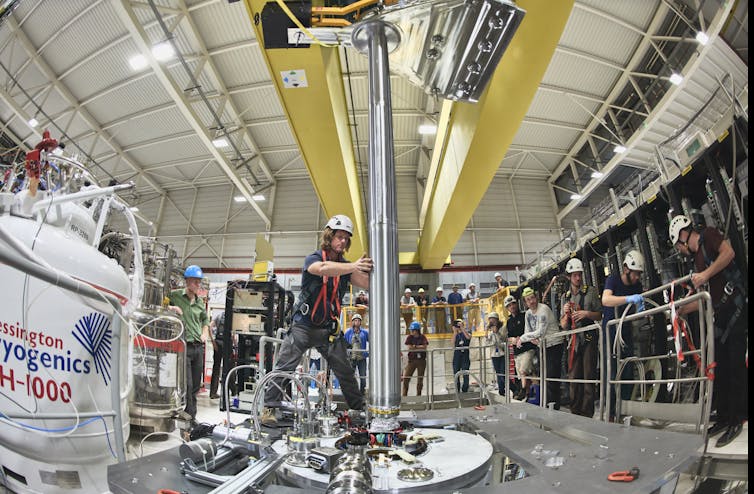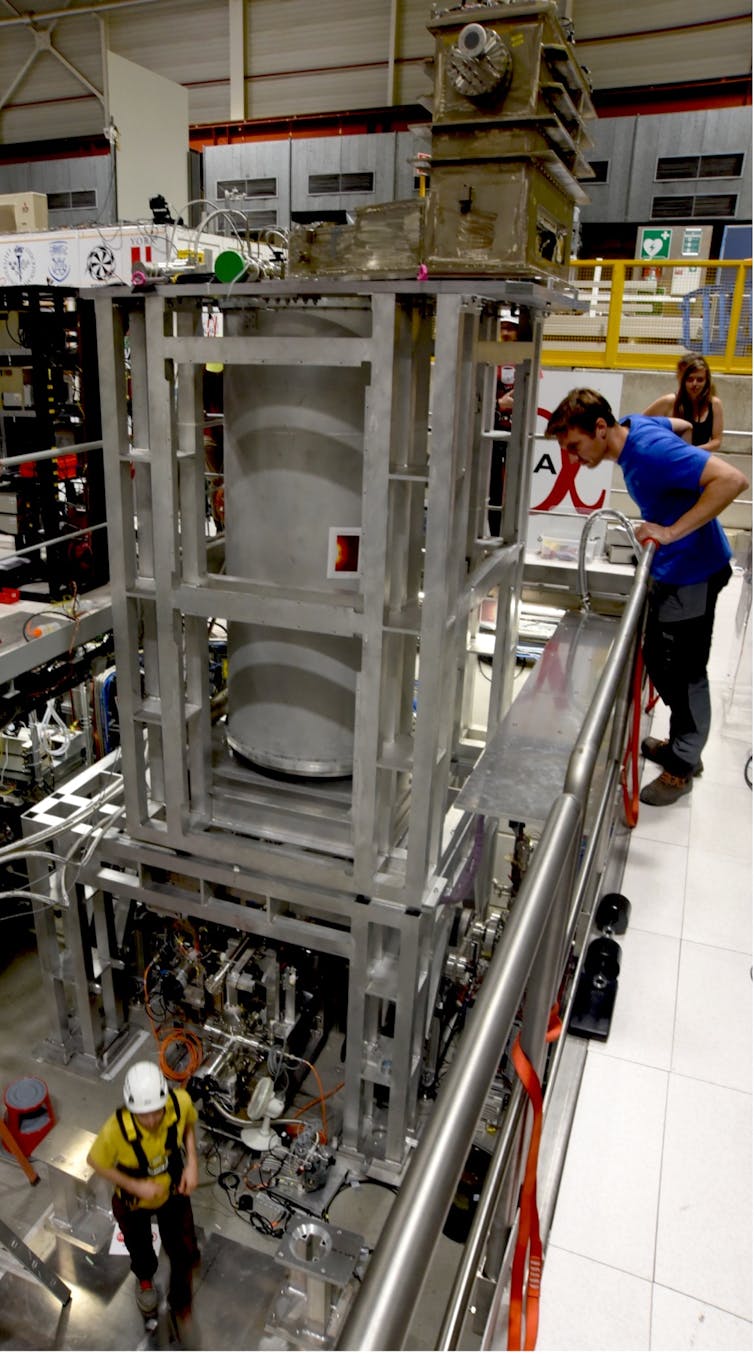Science
Antimatter: we cracked how gravity affects it – here’s what it means for our understanding of the universe

Cern, CC BY-SA
A substance called antimatter is at the heart of one of the greatest mysteries of the universe. We know that every particle has an antimatter companion that is virtually identical to itself, but with the opposite charge. When a particle and its antiparticle meet, they annihilate each other – disappearing in a burst of light.
Our current understanding of physics predicts that equal quantities of matter and antimatter should have been created during the formation of the universe. But this doesn’t seem to have happened as it would have resulted in all particles annihilating right away.
Instead, there’s plenty of matter around us, yet very little antimatter – even deep in space. This enigma has led to a grand search to to find flaws in the theory or otherwise explain the missing antimatter.
One such approach has focused on gravity. Perhaps antimatter behaves differently under gravity, being pulled in the opposite direction to matter? If so, we might simply be in a part of the universe from which it is impossible to observe the antimatter.
Our new study, published in Nature, reveals how antimatter actually behaves under the influence of gravity.
Other approaches to the question of why we observe more matter than antimatter span numerous sub-fields in physics. These range from astrophysics – aiming to observe and predict the behaviour of antimatter in the cosmos with experiments – to high energy particle physics, investigating the processes and fundamental particles that form antimatter and govern their lifetime.
While slight differences have been observed in the lifetime of some antimatter particles compared to their matter counterparts, these results are still far from a sufficient explanation of the asymmetry.
The physical properties of antihydrogen – an atom composed of an antimatter electron (the positron) bound to an antimatter proton (antiproton) – are expected to be exactly the same as those of hydrogen. In addition to possessing the same chemical properties as hydrogen, such as colour and energy, we also expect that antihydrogen should behave the same in a gravitational field.
The so-called “weak equivalence principle” in the theory of general relativity states that the motion of bodies in a gravitational field is independent of their composition. This essentially says that what something is made of doesn’t affect how gravity influences its movements.
This prediction has been tested to extremely high accuracy for gravitational forces with a variety of matter particles, but never directly on the motion of antimatter.
Even with matter particles, gravity stands apart from other physical theories, in that is has yet to be unified with the theories that describe antimatter. Any observed difference with antimatter gravitation may help shed light on both issues.
To date, there have been no direct measurements on the gravitational motion of antimatter. It is quite challenging t study because gravity is the weakest force.
That means it is difficult to distinguish the effects of gravity from other external influences. It has only been with the recent advances of techniques to produce stable (long-lived), neutral and cold antimatter that measurements have become feasible.
Trapped antimatter
Our work took place at the ALPHA-g experiment at Cern, the world’s largest particle physics lab, based in Switzerland, which was designed to test the effects of gravity by containing antihydrogen in a vertical, two-metre tall trap. Antihydrogen is created in the trap by combining its antimatter constituents: the position and the antiproton.

William Bertsche / University of Manchester, CC BY-SA
Positrons are readily produced by some radioactive materials – we used radioactive table salt. To create cold antiprotons, however, we had to use immense particle accelerators and a unique decelerating facility that operates at Cern.
Both ingredients are electrically charged and can be trapped and stored independently as antimatter in special devices called Penning traps, which consist of electric and magnetic fields.
Anti-atoms, however, are not confined by the Penning traps, and so we had an additional device called a “magnet bottle trap”, which confined the anti-atoms. This trap was created by magnetic fields generated by numerous superconducting magnets.
These were operated to control the relative strengths of the different sides of the bottle. Notably, if we weakened the top and bottom of the bottle, the atoms would be able to leave the trap under the influence of gravity.
We counted how many anti-atoms escaped upwards and downwards by detecting the antimatter annihilations created as the anti-atoms collided with surrounding matter particles in the trap. By comparing these results against detailed computer models of this process in normal hydrogen atoms, we were able to infer the effect of gravity on the anti-hydrogen atoms.
Our results are the first from the ALPHA-g experiment and the first direct measurement of antimatter’s motion in a gravitational field. They show that antihydrogen gravitation is the same as that of hydrogen, it falls downwards rather than rising, within the uncertainty limits of the experiment.
This means our research has empirically ruled out a number of historical theories involving so-called “anti-gravity” suggesting that antimatter would gravitate in exactly the opposite direction as normal matter.
The current measurement is an important milestone on the experiment’s goal. Future work ALPHA-g experiment will improve its precision through better characterisation and control of important aspects of the experiment, such as the traps and the atom cooling systems.
There’s still ample room to find new results than can help explain matter-antimatter asymmetry. Physics is meant to describe observed reality, and there can always be surprises in the way the world works.![]()
William Bertsche, Lecturer in Particle Physics, Manchester University
This article is republished from The Conversation under a Creative Commons license. Read the original article.





















